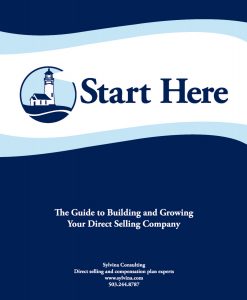 If you are considering using another company’s compensation plan, exactly the same or with a few changes, you need to watch this video.
If you are considering using another company’s compensation plan, exactly the same or with a few changes, you need to watch this video.
Watch And Learn
As you watch, ask yourself the questions listed. We think you will be surprised by what you discover.
8 Common Compensation Plan Mistakes
Too High-Rank Qualifications
In setting the requirements to promote to higher titles, sometimes companies don’t realize that the performance bars they are setting are way too difficult. Most often, when this happens, it is evident in the requirements to promote to the second title in your compensation plan. For example, if your second title requires an independent representative to personally enroll 5 people, a very small percentage of all representatives will meet this requirement. If you want 50% of your people to promote to the second title, this won’t happen if your requirements are too difficult.
Too Low-Rank Qualifications
Less often (but this still happens) companies establish title promotion requirements that are too easy. For example, if all you needed to reach the highest title in your compensation plan was to recruit personally 10 people over your career, you would be building a culture that rewarded mediocre performance over a period of time instead of rewarding the building of strong teams.
Insufficient Recognition
Recognition is vital to the compensation strategies of all direct selling companies. From time to time, we see companies whose compensation plans don’t have titles. In other words, everyone is a consultant, or everyone is paid the same way. For example, everyone earns 5% on the sales volume of 5 levels of their downline. If you have the people, we’ll pay you on them! This compensation plan mistake assumes title recognition isn’t important, but recognition is important. Like air, you can’t succeed without it.
Overly Optimistic Expectations
Everyone loves optimistic people. Well, most everyone does! It’s good to be optimistic, but it’s so much better to be realistic when it comes to salesforce performance. For example, if you think everyone enrolled is going to enroll 5 others, you’ll be vastly disappointed. Not only that, but you will set unrealistic expectations for your sales force, too. Understanding the performance of average and atypical representatives is critical. If you don’t have this handled, you need some help. (At Sylvina Consulting, we can help you!).
Insufficient Rewards To Recruit Others
Direct selling companies depend on recruiting for growth. If your compensation plan doesn’t motivate and reward recruiting, you won’t get the volume of recruiting that you need to grow your company. Some companies pay very small bonuses on the sales volume of personally enrolled representatives. This is a serious mistake. Consider this: if you don’t reward recruiting sufficiently, the percentage of those who recruit will be low, but even worse, the percentage of those who recruit again will be even lower! Make sure your compensation plan rewards the recruiting behavior. At the same time, don’t make the mistake of paying representatives merely for the act of recruiting. All bonuses should be based on sales volume!
Insufficient Rewards To Teach Others
Recruiting is important, but so is supporting your team members. Some companies don’t adequately do this through compensation. Paying only a few levels of bonuses is insufficient to encourage and reward team-building behavior. Simply put, without adequate compensation, teams aren’t built or if they are built, they aren’t strong.
Incomplete Plan Design
I like to say if a compensation plan can be fully explained on a single piece of paper, it’s an incomplete plan. This is because fully designed compensation plans motivate and reward several distinct types of behaviors and they require many pages for a complete explanation. While an incomplete plan is much better than no plan at all, to do the job right, your plan needs to be complete. How do you know if yours is complete or incomplete? Easy. Ask Sylvina Consulting. We’ll review your plan for FREE and tell you how it looks to us.
Illegal Compensation
Some compensation plans have illegal aspects to them. Most of the time, the company with an illegal plan doesn’t know what they are doing and breaks state and/or federal laws… until someone who knows tells them. While we are not attorneys, we have worked with network marketing and party plan companies for 25 years. At the same time, we have worked closely with many MLM attorneys. We know what is illegal and what is close to the line. For example, if you require personal consumption of your products to be qualified to earn multilevel compensation, you have an illegal plan. This is but one example of illegal compensation. There are others.
Easy Mistakes
Just like other things in life, it’s easy to make mistakes. Some kinds of mistakes have minor consequences. Compensation plan mistakes can have significant impacts on your company’s growth and health.
6 Compensation Plan Myths
Compensation plan myths are especially dangerous because they can lead to poor business decisions that can kill or wound your company. Here are 6 of them:
Myth #1: Simple Is Better
Almost everyone wants their compensation plan to be simple. There is a widely held belief that compensation plans don’t need to be so complex. If only it were so.
There is only one good thing about simple compensation plans and that is, that they can be explained easily. Other than that, simple plans are bad for your business and the business of your independent representatives.
This is because simple compensation plans don’t motivate and reward the 12 essential behaviors that we want from your sales force.
If you look at the compensation plans of successful companies, you will see that none of them are simple.
Myth #2: Most People Will Recruit
“This business is all about recruiting. That means everyone who joins my company (or almost everyone) will recruit others. That’s a fact.”
Actually, that’s a myth! The truth is that most people won’t ever recruit, but fortunately, some of them will.
For direct selling companies that discourage joining just for product discounts, the percentage who will recruit at least one will fall between 15% and 35%. If your barrier to entry is low and people will join just to save money when they order your products, your rate of recruiting may be less than 15%.
If your compensation plan is designed based on the assumption that almost everyone will recruit, you will have a big problem.
Myth #3: I Should Borrow Another Company’s Plan
“If it’s good for company ABC who is successful, then if I borrow their plan perhaps with a few changes, that means I will be successful, too.”
Nope, that is myth #3. The compensation plan is an important ingredient in the recipe for success, but it’s not the only ingredient, and using another company’s plan can turn out to be a very bad business decision. Square peg, round hole.
If you do this, you are assuming your company will make the same decisions the other company made when its plan was designed. Here is the problem… You don’t have enough information to know whether these decisions that were made by others for their company are appropriate for you and your company.
So, when can I use another company’s compensation plan?
Myth #4: I Should Build My Own Plan
Designing a compensation plan is a lot like building a new house. For your home to be structurally sound, financially affordable, legally compliant with building codes, and designed to last your family for years as it grows and its needs change, it’s wise to have experts design your home and other experts build it.
The average Joe or Jill doesn’t have the skills and experience to be able to design a compensation plan that will work well to attract and compensate new reps, encourage and reward leadership development, and provide the ability to generate full-time income and more for top performers. The majority of people do not know how to design a legal compensation plan either, because they don’t know the laws.
That’s why most people don’t build their own houses or design their own compensation plans. When a compensation plan is needed, they hire a direct selling expert.
Myth #5: I Should Patent My Compensation Plan
A patent is an exclusive right granted by a government to an inventor to manufacture, use, or sell an invention for a specific number of years.
The purpose of a patent is to protect your invention by preventing others from benefiting financially from it. Patents are granted for new inventions or new uses of inventions.
Multilevel compensation plans are built with components, almost all of which have been used before by other companies. So, it would be very difficult to obtain a patent on your compensation plan unless it was so different from others in all aspects. And if it was so different, it would probably not be very good.
You may have read about compensation plans that are “patent pending.” This means a patent application was filed for a plan. It doesn’t mean a patent was granted or ever will be.
Don’t waste your time filing a patent application for your compensation plan.
Myth #6: Matrix Compensation Plans Are Good
There are different types of compensation plans. One of them is a “matrix.”
Matrix compensation plans operate with a structure that limits the number of representatives who can be placed on the first level. With a matrix compensation plan, the upline helps to build the downline. This is called “spillover.”
For example, if a company used a 3×5 matrix, each representative would have, at most, three representatives placed on his first level. Each of the three positions immediately below a representative can be filled by the representative or by an upline representative.
When the first level is full, the sponsor chooses specifically where to place a newly enrolled representative, or direct selling software can place the new representative in the first open position.
I believe that history is a good teacher. Do you know how many direct selling companies with matrix compensation plans have made it to their 10th birthday?
The answer is one and that one, Melaleuca, uses the enrollment structure for qualification requirements. The matrix structure is used only for placement. Every other company that has chosen to use a matrix compensation plan has lived a short life.
There is a reason for this, and that is, if you tell your reps they don’t have to work very hard due to spillover, they will listen to you. Not working hard is exactly what you don’t want them to do.
Our Compensation Plan Design Approach
At Sylvina Consulting, we follow our proprietary 15-step approach to compensation plan design where each step is important.
- Perform a client intake interview to ask questions to understand the client’s business.
- Request cost and pricing information to be able to calculate the average, group, and per item multipliers.
- Work with the client to set a total field compensation budget, the largest piece of which will be compensation plan earnings.
- Educate the client on compensation plan types so that the client can choose the type of plan that they like best.
- Present the 12 key compensation plan behaviors we want from an independent direct selling sales force.
- Explain several recommended ways to motivate and reward each behavior.
- Let the client select from the good choices we recommend to them for consideration, or collaboratively come up with new ways to compensate for performance based on client input.
- Create a technical design document that explains all of the business rules of the compensation plan for the software company. This is not a one-page chart. It is a 10-20 page document.
- Model the plan in an Estimated Payout Spreadsheet to estimate the total payout at plan maturity.
- If the total payout exceeds the compensation plan budget, adjust the plan requirements or rewards accordingly to reduce the total payout.
- When the compensation plan design is approved by the client, send the technical design document to the client’s MLM software company.
- Answer the software company’s questions on the plan and review the many versions of its specification document until their document is both accurate and complete.
- Review the client’s compensation plan field documents or create them for the client.
- Audit the results of the first commission runs. Report problems found to the software company and retest after fixes have been made.
- Teach the client how to do the auditing themselves.
Our process ensures that a client receives a compensation plan that fits their business and the priorities of the owners.
12 Key Behaviors
Compensation plans should be designed to motivate specific behaviors of independent sales representatives and their retail customers. These behaviors are:
- Personally purchasing your products or services
- Selling to customers (non-participants of the income opportunity)
- Introducing the income opportunity to others (sponsoring/recruiting)
- Building a team
- Training, supporting, and nurturing others
- Becoming a leader
- Personally developing leaders
- Helping other leaders to develop leaders
- Meeting or exceeding minimum activity requirements
- Being promoted to a higher title or rank
- Meeting or exceeding title maintenance requirements
- Staying active and engaged in the business (retention)
Does your plan address them all well?
Compensation Plan Design
Sylvina Consulting designs compensation plans for both new and existing home party plan and network marketing (MLM) companies. We also work closely with MLM software companies on your behalf to implement and audit your compensation plan programming.
We create field documents, PowerPoint presentations, and video scripts for plans we design, or for compensation plans designed by others.
For New Companies
With companies new to direct selling, our approach starts with education. We discuss with you the differences among the various types of compensation plans including unilevels, stair-step breakaways, matrices, binaries, and hybrids. We also explain the pros and cons of each type of plan.
At the same time, we gather information from you regarding your products, your cost of goods, and the preliminary budget as a percentage of sales for total field compensation. All of this information is important so that we can design a compensation plan that meets your goals and priorities.
For Established Companies
If you have an established business and you’re seeking help to amend or rewrite your compensation plan, we take the time to talk with you and listen as you share with us the challenges of the current plan and your goals. Next, we review the requested statistical information to identify any additional areas in your plan in need of attention.
Once the preliminary tasks have been addressed, we move quickly into designing the components of your compensation plan.
Compensation Plan Evaluation
If you have a compensation plan already but need guidance to ensure it is in good shape, we can also help you.
For Established Companies
We offer a results-oriented review of your current or proposed plan, with recommendations included for changes to align the plan with your margins, products/services, and desired sales force behaviors.
Before you announce your new compensation plan, obtain the council of the compensation plan experts at Sylvina Consulting.
For New Companies
If you’ve designed your own compensation plan, but you’re not sure if it will produce the desired results, we can evaluate your proposed plan and provide you with professional advice in the areas in which the plan should be amended.
Conclusion
It’s never wise or safe to use another company’s compensation plan.
Sylvina Consulting can help you to design a new, or modify an existing, compensation plan. We can also answer your questions about compensation plans. If you have questions or need help, please feel free to contact us at 503.244.8787, or send me an email at jay@sylvina.com.

 Jay Leisner, the President of Sylvina Consulting, is a top compensation plan and direct selling expert, a trusted adviser to new and established network marketing and party plan companies. For more than 30 years, Jay has enjoyed assessing and improving network marketing, party plan and referral marketing companies across the globe.
Jay Leisner, the President of Sylvina Consulting, is a top compensation plan and direct selling expert, a trusted adviser to new and established network marketing and party plan companies. For more than 30 years, Jay has enjoyed assessing and improving network marketing, party plan and referral marketing companies across the globe.
Leave a Reply